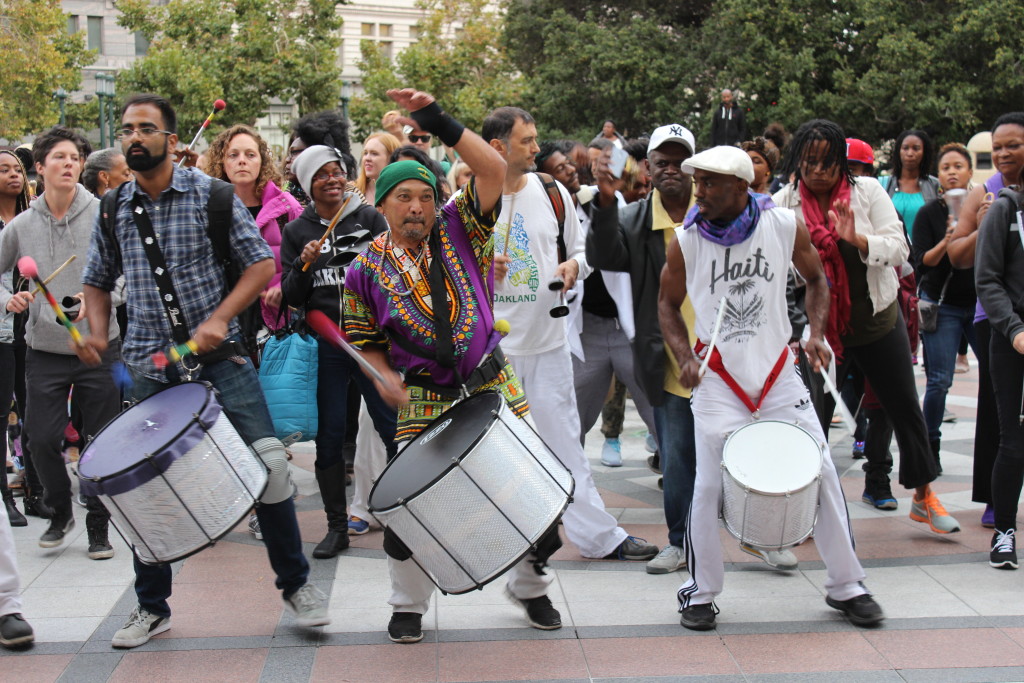Racially Profiled, Drummers Make Noise about Gentrification in Oakland
Oct 4, 2015
Posted in Arts and Culture, Equal Rights/Equity, Gentrification

By Tulio Ospina
Over one hundred people, most of them drummers, gathered in front of City Hall Monday evening to bring attention to what longtime Oaklanders feel is an increase in tensions between longtime residents and the influx of newcomers to the city.
The drum circle protest was catalyzed by an incident at the new amphitheater around Lake Merritt on Sunday night when a white man assaulted a circle of Black and Latino drummers from the SambaFunk! Funkquarians for playing their drums and then called the police on the musicians.
The man pressed charges against several of the drummers for assault and the group was forced to stay put for hours as about 13 police officers wrote mandatory reports and cited the members who were charged, while the man was free to leave after pressing charges.
Eventually, one of the drummers pressed charges against the man for assault, as well, claiming the man had grabbed his drumsticks from his hand to force him to stop playing.
For a number of community members, the conflict between the drummers and the upset neighbor, with the police siding against the locals, exemplifies the type of interactions longtime residents are loathing as the city is quickly being gentrified by many who are unfamiliar with and unsympathetic to Oakland’s deep, cultural traditions.
According to Theo Williams, artistic director of the SambaFunk! Funkquarians who ultimately pressed charges against the disrupter, “All of this is really under the sweeping umbrella of gentrification. It’s new people—not from Oakland—moving into a cultural environment, not understanding it and trying to change the nature of it.”
Williams said the drummers on Sunday night were not practicing past curfew and not doing anything illegal.
“The main issue is how the police respond when they’re called out and see a group of people of color and a non-person of color making accusations and claims against them,” said Williams. “Are the police responding in a fair and unbiased way until they can figure out what’s really going on?”
On Monday in front of City Hall, Councilmember Abel Guillen, whose district the incident occurred in, approached the group of drummers and assured them he would try to find solutions and “resolve issues with all impacted and to have this conversation with OPD.”
Guillen also mentioned his commitment to reviving the Oakland Arts Commission—which was defunded under Mayor Ron Dellums in 2008—to “make sure that the arts community has a seat at the table” and to “deal with these issues.”
In a Facebook post he wrote after hearing about the altercation, Guillen said the incident felt like a red flag that brought attention to “the broader social backdrop of the stress, insecurity and outrage we see reflected in public reactions against police actions, the escalating housing crisis, and the conflicts over cultural displacement in our diverse neighborhoods…”
Eric Arnold, spokesperson for the Oakland Creative Neighborhoods Coalition (OCNC), said an arts commission is greatly needed “to advocate for community artists and help them navigate the maze of bureaucracy we’re dealing with in city government.”
According to Arnold, such a commission would need to ensure cultural equity in Oakland by prioritizing local artists and historically underrepresented communities in allocations and funding.
“Ideally, this would be a community-oriented process of cultural development that helps uplift and build healthy communities,” he said. “It should do things like generate and analyze data around equity and inequality so we can project it onto the arts segment and creative ecosystem of Oakland.”
Monday’s drum circle protesting the effects of gentrification on Oakland’s diverse culture went hand-in-hand with a special hearing that City Council held on Wednesday night to discuss a roadmap to promote housing equity in Oakland.
At the meeting, councilmembers heard the testimonies of several Oakland residents who have experienced similar interactions with new residents that they feel are aggressive and disrespectful of the city’s cultural history.
Community centers such as the Malonga Casquelourd Center and the Humanist Hall, which have provided performance and gathering space to Oakland’s diverse residents for decades, have been forced to respond to the few neighbors who repeatedly file noise complaints.
During the city council hearing, a representative of Pleasant Grove Baptist Church in West Oakland, a predominantly Black church, testified that police have repeatedly been called to handle noise levels during their services.
Paul Cobb, publisher of the Post, also expressed his concern, reminding councilmembers that worshiping and celebration in the Black community often generates a “joyful noise” that cannot be suppressed.
Cobb is inviting housing rights activists and those participating in the Black Lives Matter movement to join the Post in attending the churches that have received complaints for their loud worship services.
“The intention is to show support and to make a joyful noise for the community,” said Cobb. “When we’re talking about Black lives, it’s good to remember that Black noise matters, too.”